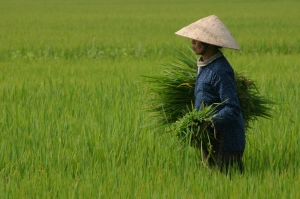Want to make a small fortune farming?
 If you want to make a small fortune farming, the saying goes, you should start with a large one. Everyone loves to poke fun at the poor old farmers, but it might finally be the farmers' turn to laugh.
If you want to make a small fortune farming, the saying goes, you should start with a large one. Everyone loves to poke fun at the poor old farmers, but it might finally be the farmers' turn to laugh.
You can't pick up a paper at the moment without reading about the global food shortage and the associated boom in soft commodities (ie the ones you grow rather than mine). We've seen rioting in Egypt, Mexico and Bangladesh, and Wal-Mart has taken the extraordinary step of restricting the amount of rice any one person can buy.
With increasing wealth in Asia comes increasing consumption of food. There's only so much land in the world and large tracts of what is available have – due to some of the most idiotic government policy ever legislated – been devoted to the production of biofuels. Just as has happened in the world of hard commodities (precious metals, iron ore, oil etc) rising demand and limited supply will lead to sky-high prices: all we need to do is work out how to profit from it.
Or so the argument goes. But before you fall for the next investment bank marketing campaign (if we're talking about it, they're working on a product), there are some differences between soft and hard commodities that are worth bearing in mind.
Firstly, droughts and floods can periodically rock supply but, in stark contrast to the long development times in the mining world, farmers can adjust their production on an annual basis. Not only can they switch between crops depending on expected price, but they make decisions about how much to spend on fertiliser, water and more productive (but more expensive) seed varieties each and every year.
So, whereas it might take five years to add capacity to an existing mine or 10 years to build a new one, the supply of soft commodities can be altered significantly within 12 months.
Another crucial difference is that the substitution effect is a lot greater for food than it is for hard commodities. You need iron ore to make steel and, for now at least, you need steel to make buildings. But when it comes to choosing a fillet of steak or some prime lamb cutlets, most of us can be swayed by price. When there's a shortage of one particular type of food, people use alternatives.
Farmers are already making the necessary adjustments. Plantings have increased, Australia's prospects are looking better, the price of wheat is at a 5-month low and rice is 10% off its highs. If the world has a relatively trouble-free year of production, there will be plenty of food to go around – which would be bad news for the farmers but good news for everyone else.











